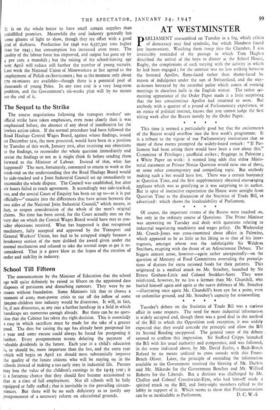AT WESTMINSTER P ARLIAMENT reassembled on Tuesday in a fog, which
critics of democracy may find symbolic, but which Members found
just inconvenient. Watching them troop into the Chamber, I .vas irresistibly reminded of the passage in which Tom Hughes described the arrival of the boys to dinner at the School House, Rugby, the complexions of each varying with the activity in which he had been engaged ; for the contrast was no less striking between the bronzed Apollos, flame-faced rather than shame-faced by reason of indulgence under the sun of Switzerland, and the stay- at-homes betrayed by the catarrhal pallor which comes of evening meetings in cheerless halls in the English winter. The rather un- exciting appearance of the Order Paper made it a little surprising that the less conscientious Apollos had returned so soon. But anybody with a quarter of a pound of Parliamentary experience, or an ounce of political instinct, knows that you cannot judge the first sitting week after the Recess merely by the Order Paper.
This time it seemed a particularly good bet that the excitements of the Recess would overflow into the first week's programme. It is a tribute to the vigour of our Parliamentary institutions that so many of these events prompted the widely-heard remark : " If Par- liament had been sitting there would have been a row about this." Committee of Privileges ; unofficial strikes ; floggings in Palestine ; a White Paper on work: it seemed long odds that either Minis- terial statement or Private Notice Question would raise one of these, or some other contemporary and compelling topic. But anybody making such a bet would have lost. There was a certain buoyancy at Question Time, and the first supplementary obtained encouraging applause which was as gratifying as it was surprising to its author. But in spite of instinctive expectation the House went straight from Question Time to the discussion of the Statistics of Trade Bill, as advertised : which shows the incalculability of Parliament.
Of course, the important events of the Recess were touched on, but only in the ordinary course of Questions. The Prime Minister was answering on Tuesday and dealt with questions relating to industrial negotiating machinery and wages policy. On Wednesday Mr. Creech-Jones was cross-examined about affairs in Palestine, which appeared to be as little to his liking as to that of his inter-
rogators, amongst whom was the indefatigable Sir Waldron Smithers, erupting with the threat of an Adjournment Debate. The biggest contest arose, however—again rather unexpectedly—on the question of Ministry of Food Committees overruling the prescrip- tions of doctors for extra rationed foods for their patients. This originated in a medical attack on Mr. Strachey, launched by Sit Ernest Graham-Little and Colonel Stoddart-Stott. They were reinforced, however, by no less a layman than. Mr. Churchill, who hurled himself again and again at the suave defences of Mr. Strachey —illustrating once again Mr. Churchill's keen eye for a point, even on unfamiliar ground, and Mr. Strachey's capacity for stonewalling.
* * * * Tuesday's debate on the Statistics of Trade Bill was a curious affair in some respects. The need for more industrial information is widely accepted and, though there was a good deal in the method of the Bill to which the Opposition took exception, it was widely expected that they would concede the principle and allow the Bill its Second Reading unopposed. The general tenor of the debate • seemed to confirm this impression. Sir Stafford Cripps launched the Bill with his usual authority and competence, and was followed, in the sense indicated above, by Mr. David Eccles, a Back-Bench Roland by no means unfitted to cross swords with this Front- Bench Oliver. Later, the principle of extending the information available to the Government received the blessing of Mr. Durbin and Mr. Mikardo for the Government Benches and Mr. Wilfred Roberts for the Liberals. But a division was challenged by Mr. Challen and Colonel Crosthwaite-Eyre, who had himself made a spirited attack on the Bill, and forty-eight members rallied to the lobby in support of it. Which seems to show that Parliamentarians can be as incalculable as Parliament. D. C. W.-S


































 Previous page
Previous page